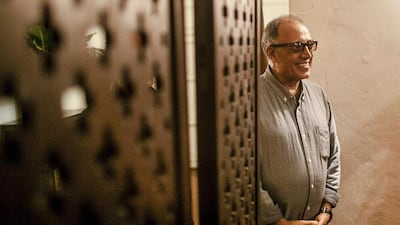Tributes have been pouring in from across the cinema world for Iranian director Abbas Kiarostami, who died at the age of 76 on Tuesday following a short battle with gastrointestinal cancer.
Among the most glowing tributes to the Palme d'Or winner was from New York's The Film Stage magazine, which tweeted simply: "the world may have lost its greatest filmmaker".
Kiarostami was born in Tehran in 1940 and worked as a commercial director for Iranian TV before making his first feature, 1977's Report, the tale of a tax collector accused of taking bribes.
The director was one of a select band who remained in Iran following 1979’s revolution and kept making films there despite the difficulties and censorship presented by the revolutionary government.
He maintained throughout his career that Iranian cinema should retain its identity regardless of politics, once saying: “I believe this is our only chance to speak outwardly. Iranian cinema has always maintained its style, one, because of the want of its directors and another, because of the chance that it has been given in world cinema.”
Iranian cinema has been enjoying great success in recent times. Ana Lily Amirpour's A Girl Walks Home Alone at Night (2014) and Asghar Farhadi's Oscar-winning A Separation (2011) were met with critical, box office and festival success around the world.
Kiarostami, however, was among the first post-revolutionary Iranian directors to achieve international recognition following the critical success of 1990's Close-Up.
The movie tells the true story of Tehran man Hossain Sabzian, who impersonated filmmaker Mohsen Makhmalbaf and conned a family into thinking they would star in his next movie.
The movie stars Sabzian, an actual family and Kiarostami all playing themselves. It was almost universally panned by Iranian critics following its domestic release. On achieving an international release, however, critics took a rather different view – as recently as 2012 the movie polled at number 42 in the British Film Institute’s critics’ list of the greatest 50 movies of all time.
Kiarostami went on to win his, and Iran's, first Cannes Palme d'Or for 1997's Taste of Cherry, the tale of a man looking for someone to bury him following his planned suicide. He had further success with 1999's The Wind Will Carry Us, which picked up Venice's Grand Jury Prize. In 2000 Kiarostami was awarded the Akira Kurosawa Prize for Lifetime Achievement in Directing at the San Francisco Film Festival, although he gave his prize to fellow Iranian director Behrooz Vossoughi in recognition of his contribution to Iranian cinema.
Kiarostami’s friend, film professor Jamshid Akrami, notes that he was keen to use his movies to offer an alternative look at his oft-misunderstood homeland: “Iran hasn’t been enjoying the best image in terms of how the rest of the world thinks about Iran, so we would always go to people like Mr Kiarostami, who would take pride in his work and how he was representing the Iranians.”
Although Kiarostami was proudly Iranian, he was also open to other influences — in 2005 he teamed up with British director Ken Loach and Italian Ermanno Olmo to make the three-parter Tickets.
In 2010, he made his first film outside Iran, the Juliette Binoche-starring Certified Copy, which shot in Tuscany.
His final film, 2012's Like Someone in Love, was filmed in Japan and tells the story of a student who moonlights as a high class escort. The movie competed for that year's Palme d'Or, although it lost out to Michael Haneke's Amour.
Appreciation of Kiarostami isn’t restricted to critics — the legendary French director Jean Luc Godard once stated that: “Film begins with DW Griffith and ends with Abbas Kiarostami.” As endorsements go, they don’t come much more resounding.

